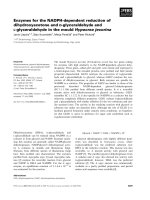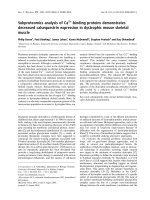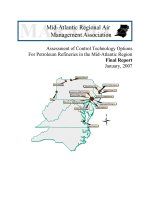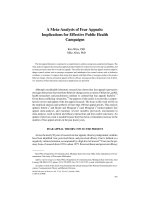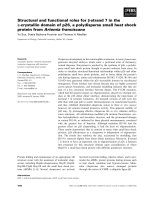Analysis of reward management options for low paid workers in the indian hospitality sector
Bạn đang xem bản rút gọn của tài liệu. Xem và tải ngay bản đầy đủ của tài liệu tại đây (1.58 MB, 91 trang )
Reward Management
Title: Analysis of reward management options for low paid workers
in the Indian hospitality sector: A case study of Royal Orchid Hotel
Ltd, Brindavan Garden Mysore.
Dissertation submitted in part fulfillment of the requirements for the degree of MBA in Human
Resource Management at Dublin Business School
Vijeth Prabhakar
MBA in Human Resource Management
1
2019
Reward Management
Table of Contents
Declaration……………………………………………………………………………………….6
Acknowledgment………………………………………………………………………………...7
Abstract…………………………………………………………………………………………...8
Chapter 1 – Introduction & Background…………………………………………………………9
1.1 Introduction……………………………………………………………………...........9
1.2 Background…………………………………………………………………………..11
1.3 Research Aim………………………………………………………………………...12
1.4 Research Objective…………………………………………………………………..12
1.5 Research Question……………………………………………………………...........12
Chapter 2 – Literature Review……………………………………………………………...........13
2.1 Introduction………………………………………………………………………….14
2.2 The impact of human resource management practices in hospitality industry………15
2.3 Quality of work life & Job satisfaction………………………………………………17
2.4 Reward management system in Hotel Industry……………………………………..20
2.5 Does incentive plan provide wages? ..........................................................................22
2.6 Non – financial factors in retirement………………………………………………..23
2.7 Compensation practices and organization performance…………………………….25
2.8 Employee Motivation in Hotels…………………………………………………….28
2.9 Organization culture and quality towards work…………………………………….30
2.10
Employee engagement in Hospitality Industry…………………………………34
2.11
Attrition and competencies in Hospitality Industry……………………………36
2.12
Employee turnover concept in Hospitality Industry……………………………38
2.13
Performance Related Pay…………………………………………………….....41
Chapter 3 – Methodology……………………………………………………………………….46
3.1 Introduction…………………………………………………………………………46
2
Reward Management
3.2 Research Philosophy…………………………………………………………………46
3.3 Research Design & Approach………………………………………………………..47
3.4 Research Collection………………………………………………………………….48
3.5 Research Sampling…………………………………………………………………..49
3.6 Data Collection……………………………………………………………………..50
3.6.1 Primary Data……………………………………………………………..50
3.6.2 Secondary Data………………………………………………………….52
3.7 Interview Selection and Survey……………………………………………………53
3.7.1 Linking to the research…………………………………………………..54
3.7.2 Data Standard……………………………………………………………54
3.7.3 Preparing the interviews and surveys……………………………………55
3.8 Ethical Issues………………………………………………………………………56
3.9 Research Limitations………………………………………………………………57
Chapter 4 – Findings, Analysis and Discussion……………………………………………….58
4.1 Introduction……………………………………………………………………….58
4.2 Interview Participants and Survey respondents profile……………………………58
4.3 Qualitative Questionnaires…………………………………………………………58
4.4 Quantitative Questionnaires……………………………………………………….66
Chapter 5 – Conclusion & Recommendation………………………………………………….78
5.1 Conclusion………………………………………………………………………….78
5.2 Recommendation…………………………………………………………………..79
3
Reward Management
Chapter 6 – Reflection on Self – Learning……………………………………………………..80
Bibliography……………………………………………………………………………………82
Appendix 1 Survey Questionnaires……………………………………………………………87
Figures on Contents:
Figure 1 High performance work practices and employee performance………………………...15
Figure 2 Organization effectiveness relationship………………………………………………..17
Figure 3 Turnover culture in Hospitality industry………………………………………………19
Figure 4 Using balanced scorecard as a reward management system…………………………..21
Figure 5 Relation between Incentive plan, Non – financial measures & financial performance..23
Figure 6 the moderating effects of Hotel performance…………………………………………24
Figure 7 Linking organization practice and performance………………………………………26
Figure 8 Education levels of employees in Hospitality industry……………………………….27
Figure 9 Motivation in Hospitality Industry…………………………………………………..29
Figure 10 Relation between organizational culture and quality………………………………31
Figure 11 Influence of organizational culture on responsiveness and performance of firms....33
Figure 12 Effect of accommodation between personal accomplishment & hospitality industry..35
Figure 13 Relationship between manager and employee satisfaction………………………….38
Figure 14 Predictors of employee turnover intentions………………………………………….40
Figure 15 the interaction effect of workplace Flexibility……………………………………….41
4
Reward Management
Figure 16 Performance Based Pay……………………………………………………………….43
Figure 17 Competency based pay, individual needs and creativity……………………………..45
Figure 17 Surveys on age group…………………………………………………………………66
Figure 18 Surveys on Gender……………………………………………………………………67
Figure 19 Surveys on Marital status…………………………………………………………….68
Figure 20 Surveys on Current employment status………………………………………………69
Figure 21 Surveys on Qualification……………………………………………………………..70
Figure 22 Survey on Current Monthly income…………………………………………………71
Figure 23 Survey on years of experience……………………………………………………….72
Figure 24 Survey on the current reward system for non – executives………………………….73
Figure 25 Survey on growth for non – executives………………………………………………74
Figure 26 Survey on current system and management are effective & motivated………………76
Figure 27 Learning Style………………………………………………………………………...81
5
Reward Management
Declaration:
I hereby, Vijeth Prabhakar declare that this research is my original work and that it has never
been presented to any institution or university for the award of Degree MBA. In addition, I have
referenced correctly all literature and sources used in this work and this work is fully compliant
with the Dublin Business School’s academic honesty policy.
Signed: Vijeth Prabhakar
Date: 07/01/2019
6
Reward Management
Acknowledgement:
I wish to express my deepest appreciation to all the people that have contributed and helped me
to complete the dissertation. I am very thankful and gratitude to my supervisor Mr. Martin
O’Dea who guided me in a right way throughout my dissertation and it was impossible without
his guidance. His knowledge and his experience helped me a lot to gain knowledge and make
significant progress throughout the research. I also like to thank my parents for supporting me. I
would like to dedicate this research to my parents.
7
Reward Management
Abstract:
This research seeks to explore the reasons what is required to manage people in an organization
and understanding how to motivate the non – executive employees through a well – structured
reward and recognition policy. This study shows that there is no effective reward system and
policy in the organization to motivate their non – executive employees. We have provided in the
study an approach to the organization to design and re – structure the reward system. Firstly, it
gives a comprehension idea of reward system in the organization, why they work and the best
condition which suits them to work and what circumstances are most effective. Secondly, it
exhibits a structure of ideas and thoughts – a structure that is basic to assemble into a coordinated
reward system. At last, it suggests a distinguished method for measuring the effectiveness of a
reward structure of an organization’s philosophy and goals. This study was based on a case study
of a particular organization. This method will make an organization to decide whether it is, to be
sure, getting the premeditated motivational effectiveness from its immense pay and remuneration
expenditure. If it isn’t, the characteristic method has the capacity of distinguishing the
implementing of the strategy, practice, system and proper structure for the non – executive
employees.
8
Reward Management
Chapter 1 - Introduction and Background:
1.1 Introduction:
Paying employees for their efficiency has been the foundation of organizational and business
improvement for a quite long time. Financial related reward had dependably been imperative in
dealing with handling employee’s performance, yet in the course of the most 20 years different
components of pay have created to give managers more extension to reward and to motivate
workers.
According to Michael Armstrong et al “performance is characterized as conduct that achieves
results. Performance management impacts on the performance by helping individuals to
comprehend what great performance implies and giving the data expected to enhance it. Reward
Management impacts performance by perceiving and compensating great performance and by
giving motivations to enhance it” (Michael Armstrong et al, 2016).
The justification behind this research is to recognize how these rewards affect employees and
how well present reward management structure does this, inside the organization shaping the
reason for my research.
Habib et al states that, describe the significance of working culture and environment remunerates
as:
Reward is plainly fundamental to the work relationship. While there are a lot of individuals who
appreciate working and who guarantee they would not quit working regardless of whether they
were to win a major, the vast majority of us work in huge part since it is our solitary methods for
procuring the cash we have to continue us and our families. The amount we are paid and in what
shape is in this way an issue which matters immensely to us (Habib et al, 2014).
The reward that we concern to both individual and team performances are thus evaluative in
deciding how perceptual our reward approach will be.
Rewards and their motivation as including structures, policies and practices that impact the
activities of individuals. The reason of reward systems is to give a methodical method to convey
9
Reward Management
positive results. The main purpose is to give positive results to commitments to wanted
execution.
Characterizing the idea of Human Resource Management in the mid 1990’s directed to a more
recognition and appreciation for the value of work force could make to the overall business goals
of the company and how it could be executed and developed to increase the value of upper hand.
The main purpose of this research, the ideal result is to appear if changed sorts of reward
structure do have positive outcomes and if these results form into expanded or diminishes
performance of the employees.
Pedro Reinares et al states that, “the important raise of reward management is that group works
and individuals see what they need to do to make their commitment to the company by and large
viability. There should be an unmistakable connection with the hierarchical targets and this
includes great correspondence of clear destinations that everybody gets it” (Pedro Reinares et al,
2007).
Based on the review of present literature, this study embarks to investigate plainly what factors
exist in crediting the right reward system to an individual employee or team. Performance
Management is both complex and tricky and truly helpless to outside impacts. For example:
financial conditions, culture and individual employee preferences and recognitions. What is
effective, applicable and perceptions on present reward systems for improving for one employee
or team might not have a similar impact on other employee’s in comparable conditions. These
turn out to be increasingly complex and harder to oversee as authoritative structures cross
universal limits and cultures. In this specific situation, the reward structure we apply can end up
essential in accomplishing the ideal dimension of performance and job satisfaction. The
researcher has worked for 4 years in the Human Resource department in 4 different organizations
and industry, holding various managerial skills and roles, so is aware of how important and
effective reward structure are to employee’s performance. As such, I aim to look at what impacts
the current reward system has on performance and to a lesser degree motivation and how that
relates with the best worldwide practice in the topics analyzed.
10
Reward Management
1.2 Background:
The study will concentrate on one organization – Royal Orchid Brindavan Garden, Mysore, a
hotel industry, having some expertise in the hotel chains and group of hotels. The hotel has
around 70 employees. Royal Orchid Brindavan Garden, Mysore has been a piece of the Royal
Orchid Hotels Ltd since 2005, when the Royal Orchid Hotels Ltd. acquired the complete hotel in
Mysore. Royal Orchid Hotels is mainly into Chain of Hotels and it has more than 50 hotels
across India, which also includes 3star, 4star, and 5star category hotels.
/>The study will mainly focus on employees who are working as non – Executives and also known
as backbone of the industry in the departments like Engineering, Electrical, House-Keeping,
Food and Beverage, Front Office, Kitchen etc.
The study proposition adopts a mixed approach to analyzing and collected primary data and
furthermore widely utilizes published literature concerning the role of performance system in
reward management and their impact on employee’s performance.
Employee retention relates specifically to how the company remunerates them. Employee
replacing in an organization can be an exhausting and costly work routine. Indeed, even in
progressively secure businesses like public sector, performance should be overseen and staff
motivated as in the private sector. Retaining of experienced employees in both these businesses
is vital to make upper hand and company success. This research will likewise look at the
significance of compensating experienced and high performing employee. So in a period when
the measure of monetary rewards is confined by the financial atmosphere, retaining workers who
are performing well with remunerations must be accomplished while making all employees feel
valued. I will explore if these qualities alongside an aggregate reward way to deal with how the
company remunerate staffs, affect performance of employees.
As an ever increasing number of companies across universal limits to direct business,
compensates that are applicable in one nation may not be vital in another. I aim to build up if a
reward system is structured and the particular type of rewards material to this company, is basic
for increasing staff performance or on the off chance that it has any impact whatsoever. This is
11
Reward Management
all with regards to a consistently evolving society, where most laborers seek to be well off such
that past ages did not. These desires from an expanding educated and portable workforce put
significantly more accentuation on the company’s reward system and structures and feature the
significance of remunerations with regards to accomplishing job satisfaction among workers and
utilizing this as an aggressive weapon against business rivals.
1.3 Research Aim:
The aim of this research is to explore the rewards and reward systems practiced to reward the
non – executives at Royal Orchid Brindavan Garden Hotel, Mysore.
This research would help to know about the non – executives, who are backbone of the
Hospitality Industry, will always have a huge contribution towards Hotel’s success. This research
will also be beneficial for the Government and Policy makers to make changes in the law or
policy for the living wage employees who have no other benefit from the industry. It will also
help HR’s of Hospitality Industries to bring some changes while implementing new policies with
adequate idea of the problems they may face by following the existing policy.
1.4 Research objective:
The objectives set for this research (using Royal Orchid Brindavan Garden as a company) are as
follows:
Present an overview of the effectiveness of reward options for low paid workers
Critique the reward management in place for low paid workers in the hospitality sector in
India, using the Royal Orchid Brindavan Garden.
Analyze the effectiveness of the methods deployed.
1.5 Research Question:
How does the Hospitality Industry incentivize living wage employees through their reward
system?
12
Reward Management
Chapter 2 - Literature Review:
2.1 Introduction:
According to Prachi Juneja, in the contemporary world, rewards for better execution and
achievement matter more than the real accomplishment itself. For sure, as the worldwide
budgetary emergency appeared, rewards were everything for the financiers as they made
progress towards more heedless wagers and expanding hazard taking. In light of the arrangement
of defective motivations, rewards were seen to a definitive prize that was more noteworthy than
the real procedure of winning. Thus, rewards administration must be found with regards to what
are appropriate and just rewards and what are lopsided prizes. For the present age, rewards
matter more than the real execution and this is reflected in their expanding requests from the
businesses for compensation climbs and rewards. Frequently, the case bosses have top picks
among the workers and this leads them to remunerate those top choices and victimize the
individuals who are not in their great books. As specified above, genuinely magnificent
organizations teach an authoritative culture that is non-oppressive, unprejudiced and free from
partially and provocation. Henceforth, the reward structure in these associations takes after the
standards of decency, equity and value. Obviously, in numerous organizations, the inclination to
play legislative issues and have top choices is too difficult to oppose for some. In this way,
without getting into optimistic ideas, it must be said that except if organizations develop
compensate frameworks that are in any event steady with essential reasonable play standards,
their authoritative societies would be in an ideal situation in the more extended term (Prachi
Juneja, 2016).
Reward constitutes a vital component in HR administration. Reward Administration is basically
about planning, executing and keeping up pay frameworks which help to enhance authoritative
execution. Reward administration is the way towards creating and enhances authoritative
execution. Reward administration is the way towards creating and getting and keeping the
general population it needs and by expanding their inspiration and duty. The reward
administration framework ought to be intended to help the accomplishment of the association’s
systems. It ought to be founded on a reasoning of reward which coordinates the way of life of the
association. Reward administration isn’t just about cash; it is likewise worried about
characteristic and additionally outward inspiration, with non-money related and additionally
13
Reward Management
budgetary prizes. The outline and activity of reward administration procedures and practices
should begin from a comprehension of the ramifications of the mental contract idea, inspiration
hypothesis are the factors influencing pay levels. Be that as it may, it must spotlight on the
necessities of the association and the general population who work on it. These requirements are
destined to be met if remunerate forms depend on a verbalized and incorporated way to deal with
the advancement of a casing work of reward rationalities, techniques and arrangements that will
bolster the accomplishment of the association’s business systems, and also going about as levers
for change (Mirza S Saiyadain, 2003).
2.1 The Impact of Human Resource Management Practices in Hospitality Industry:
Priyanko Guchait advocates that, the reason for this examination was to research the effect of a
heap of eight human asset administration hones on goal to leave, and to look at the interceding
impact of hierarchical duty on the connection between the HRM practices and goal to leave of
workers of an administration association in India. “The greater part of the earlier HRM
practices– representative turnover considers has been from the HR director's perspective. This
investigation adopted an alternate strategy and concentrated this relationship from a worker's
perspective. Web overview surveys were utilized to gather the information from 183
representatives working in an administration organization in India”. Various straight relapse and
progressive direct relapse examination were led to test the theories. The investigation found not
just that the HRM hones bring down representative aims to leave, yet additionally that this
relationship is somewhat interceded by authoritative responsibility. The aftereffects of the
examination not just bolstered that associations should center around representative impression
of the associations' HRM hones yet in addition demonstrated that HR ought to go past building
up strategies and techniques to giving a worker agreeable workplace (Priyanko Guchait et al,
2010).
14
Reward Management
According to Michael, despite the fact that the notoriety of representative commitment among
business administrators has propelled numerous professional investigations, hypothesis based
scholarly research from the hierarchical conduct viewpoint has been moderately constrained,
particularly in regards to how worker function commitment benefits workers themselves and
their associations. This examination exactly tried a hypothetical relationship display utilizing the
potential outcomes of representative commitment in the lodging setting: natural prizes, Leader–
Member Exchange (LMX), work fulfillment, and hierarchical responsibility. Aftereffects of
auxiliary condition displaying demonstrated that worker commitment was straightforwardly
connected with all guessed outcomes. This investigation additionally shown that LMX
intervened the connections of worker commitment with occupation fulfillment and hierarchical
duty, while work fulfillment interceded the connections between representative commitment and
authoritative responsibility and among LMX and hierarchical responsibility (Michael et al, FebMar2016).
Figure 1. High Performance Work Practices and Employee Performance (Karatepe O M,
2013).
According to Salih Kusluvan, Another issue in regards to human capital inside the key HRM
literature manages the 'black box' between human capital and upper hand. Note that medications
of human capital will in general spotlight on the attributes, e.g. instruction, learning, ability, and
15
Reward Management
so on, of people or gatherings. In any case, qualities don't, all by themselves, result in efficiency,
rather they give the establishment. Efficiency stems most specifically from the conduct of
representatives, and numerous exceptionally gifted workers can show unremarkable or even subpar execution. “On-time execution expanded from the base to the highest point of the business in
multi month, yet it was finished with a similar worker aptitude base. The transformational
execution change originated from those talented representatives showing their human capital
through carrying on differently. The contrast among aptitudes and conduct was not lost on
Becker. While he characterized human capital as far as attributes, he noticed that it incorporated
a more noteworthy cluster of angles, even those that may be viewed as conduct (Salih Kusluvan
et al, 2010).
According to Gary C McMahan, the idea of human capital likewise covers gathered work and
different propensities, notwithstanding including destructive addictions, for example, smoking
and medication utilize'. 'The different sorts of conduct included under the rubric of human capital
help clarify why the idea is so amazing and valuable. It likewise implies that the way toward
putting or disinvesting in human capital regularly modifies the specific idea of a man: preparing
may change a way of life from one with enduring joblessness to one with steady and great profit,
or gathered drinking may crush a profession, wellbeing, and even the ability to think straight”.
This issue identifies with the past qualification among capacity and conduct. Workers have
human capital that the firm may get through an understood business contract. Be that as it may, if
the worker feels that the firm has not managed reasonably, she/he can retain the exertion or
conduct that the firm requires or she/he can essentially leave the firm. 'Through and through
freedom' segment of representatives makes the utilization of human capital as a wellspring of
upper hand dangerous. Representatives sense, think and believe, and these procedures lead them
to pick whether or not, or the amount, to contribute. Hence, firms can have, not claim, elevated
amounts of human capital in their workforce, but then have imperfect execution. While
numerous specialists pay lip administration to this, Our most vital resources exit the entryway
every day, this part of human capital is by all accounts to a great extent overlooked in the human
capital writing (Gary C McMahan, 2011).
16
Reward Management
Figure 2 Organization Effectiveness Relationship (Salih Kusluvan et al, 2010).
2.2 Quality of work life & Job Satisfaction:
According to Eric S.W Chan et al, The hotel business is described by famously poor wages, low
professional stability, long working hours, and move works. In particular, analysts contended
that high turnover is an immediate result of representative disappointment with the association
giving what workers require in a work environment. In the cabin business, representatives need
to work in a group arranged, separate, and synergistic condition with the goal that they can
accomplish their very own objectives. Additionally, they need to have a harmony between their
work and individual life. It is basic for association to recognize and comprehend particular needs
of their workers with the end goal to guarantee that representatives are fulfilled, dedicated, and
beneficial with the activity. “Job Satisfaction manages the psychological assessment of an
occupation, given that viable assessment pursues subjective appraisal as far as attitudinal
advancement. Disconfirmation hypothesis recommends that workers assess their occupations
decidedly or contrarily by contrasting employment execution and occupation desire. Positive
disconfirmation results when seen execution is more prominent than desire, along these lines
producing fulfillment. Then again, negative disconfirmation occurs if the apparent execution is
underneath the desire”. Whenever seen execution meets desire, affirmation is set to prompt
minor satisfaction (Eric S.W Chan et al, 2015).
17
Reward Management
Petra says that In the present powerful condition, the job of workers and their level of
hierarchical responsibility are ending up progressively critical for business achievement, which is
particularly significant for the administration business when all is said in done and for the travel
industry division specifically in view of issues related with representative turnover, dedication
systems with the client, and so forth. “Employee Satisfaction is viewed as a fundamental element
for creating hierarchical duty. The primary motivation behind this investigation is to break down
the impact of various features of representative occupation fulfillment, that is, work conditions,
compensate framework, relations with bosses and associates, hierarchical (HR) approaches, on
representatives' authoritative duty in the Hotel business”. The examination speculations are tried
with an example of 760 lodging representatives on Gran India. The outcomes demonstrate the
pertinence of the working conditions, coordinate prizes, associations with chiefs, and the HR
arrangements with the end goal to build up an abnormal state of authoritative duty (Petra et al,
2015).
Keith advocates that Is has for quite some time been perceived that the financial wages paid to
numerous hotel laborers don't comprise their aggregate profit. Extra money related and nonfinancial prizes are an element of hotel business. “Shockingly, little is thought about these extra
rewards or incidental advantages, which are developing in hugeness in wage and pay
organization. As of recently the condition of learning has stayed incomplete and divided, and
discusses led in a field of relatively add up to numbness. Key to this discussion is the correlation
of hotel laborer profit with those in different ventures. The creator depicts the examination
procedure and talks about his exact information valuable to elucidate the pretended by incidental
advantages in the 'profit whole’ banter. The outcomes establish an unmistakable commitment as
far as anyone is concerned”. The creator contends that further improvement of the methods for
looking at components of remuneration, other than fundamental pay, is of specific significance.
In any case, much stays to be done especially in evacuating the imperatives on similarity before
the aggregate installment framework can be completely comprehended (Keith et al, 1983).
According to Halil Nadiri, high employee fulfillment is critical to chiefs who trust that ''an
industry has a duty to give representatives employments that are testing and naturally fulfilling''.
Person's sure enthusiastic response to specific occupation demonstrates that representatives with
higher level of trust will have more elevated amounts of employment fulfillment in the
18
Reward Management
neighborliness business. Employment fulfillment can influence numerous different factors, for
example, turnover expectations. Occupation fulfillment has a backhanded effect on turnover
through its immediate impact on arrangement of expectation to clear out (Halil Nadiri et al,
2010).
Figure 3 Turnover culture in Hospitality Industry (Margaret Deery et al, 2007).
In a service industry, while great specialized and relational aptitudes are fundamental, the two
alone can't warrant consumer loyalty. Customer Services are given by the hotel employee and the
worker's mind-set should straightforwardly influence the services gave. Thusly, consumer
loyalty is sponsored up by worker occupation fulfillment. Worker fulfillment is exhibited during
the time spent conveying services and felt by consumers. It is for sure a vital piece of the work
drive quality issue. Yields from the industry enterprises are elusive merchandise and quality or
estimation of industries picked up by the purchasers are to a great extent controlled by the
19
Reward Management
momentary execution of the industry workers. Industries are mutually given by merchants and
related faculty and the on location execution of the hotel workers decide the industry quality
stretched out to the clients. Worker occupation fulfillment straightforwardly impacts the state of
mind and way in which the industry is performed and henceforth influencing the industry quality
experienced by the consumer (Zheng Gu et al, 2009).
2.3 Reward Management System in Hotel Industry:
Daniel says that, The extraordinary enthusiasm for a productive pay related arrangement ascends
from the more evident conviction of market analysts and different experts in the HR field, that
wage isn't just an outcome, yet in addition an introduce for a compelling social-monetary action.
To this end, the down to earth determination forced at a worldwide level is that the pay related
strategy, soundly created and impeccably fit with the organization's general arrangement, can
invigorate the development of the financial productivity more than influence it. The reason for
the present article comprises in the audit of the techniques and compensating administration
arrangements in a reenacted business in the lodging - eateries field, thus called ISE (Daniel et al,
2014).
Kevin J Murphy advocates that, “Incentives has concentrated on execution measures and pay
execution sensitivities yet has to a great extent overlooked the execution standard, which creates
essential motivators at whatever point design members can impact the standard setting process.
Inside decided guidelines are straightforwardly influenced by administration activities in the
present or earlier year, while remotely decided measures are less effectively influenced. I
demonstrate that organizations pick outside measures when earlier execution is a noisy gauge of
contemporaneous execution”. Also, organizations utilizing spending plan based and other inside
decided execution models have less factors reward payouts, and will probably smooth income,
than organizations utilizing remotely decided principles (Kevin J Murphy, 2000).
According to Ibrahim Ilhan, the low pay and poor advantages usually found in friendliness and
the travel industry tasks are among the most critical reasons for low occupation fulfillment, low
inspiration, and low authoritative responsibility and employment contribution—all of which
drive high worker turnover. Small remuneration frequently passes on the message that
employee’s endeavors and commitments are minimal esteemed. Together with a physical and
20
Reward Management
enthusiastic outstanding task at hand, friendliness representatives confront view of low societal
position and glory, alongside poor business conditions and unsocial and unpredictable working
hours. We propose that accommodation representatives' remuneration ought to be more liberal to
adjust their negative business conditions. This implies pay and advantages ought to be founded
on occupation assessment, status, instruction and preparing, positions held, or more all,
representative exertion and execution. Execution based motivations and advantages are regularly
a critical apparatus for impacting worker execution and can take numerous structures, including
financial motivators and non-money related motivating forces and advantages (Ibrahim Ilhan et
al, 2010).
Figure 4 Using Balanced Scorecard as a Reward Management System (Martha S Doran et
al, 2008).
21
Reward Management
2.4 Does Incentive plan provide Wages?
Paul J Schneider says that, The issue of scope under the Employee Retirement Salary Security
Act of 1974 (ERISA) of certain reward, motivation, stock, severance and other comparable
courses of action remains a wellspring of impressive contention and case. This section audits the
elements courts use to decide if compensatory game plans are being given as per an ERISA
secured design. Besides, there is certifiably not a lot of assurance in how courts will decide if an
ERISA secured design exists. Given this vulnerability, it is prescribed that amid the arranging
stages and as a component of a business general hazard administration methodology, genuine
thought plan to be given to the upsides and downsides of choosing whether an advantage design
plan to be secured by ERISA (Paul J Schneider, 2017).
Rajiv D Banker says that, a trial of non monetary related measures utilized as a major aspect of
an administration motivation program by a U.S based, full benefit network found that upgrades
in the non budgetary measures were taken after quickly by increments in income and benefit.
The two non money related measures are consumer loyalty as estimated by visitor’s remark card
signs of profitability to return and level of complaints. While the test applies specifically to that
one chain, the exercise is critical to whatever is left in the rest of the hotel industry (Rajiv D
Banker et al, 2005).
According to Tochio Takahashi, Industries have progressively depended on remunerate
frameworks lined up with representative execution to inspire them to perform better. Analysts
have looked to clarify methods for partners compensate frameworks with execution and in
addition to comprehend their instrumentality. Studies bring up that monetary rewards fulfill
sterile elements, weight the association’s expenses and its effect on representative inspiration is
here and now. Concerning non – monetary prizes, they claim to be corresponding to the
previous, they are all the more broadly received in spending plan compelled conditions and a
representative’s decision factor when two organizations offer a similar remuneration program.
Acknowledgement programs, which are entirely one of the non – monetary related reward
shapes, are gone for strengthening gutsy conduct and are not common endeavors. As progress
elements of these projects are the surrounding of the organization’s financial conditions,
arrangement with business procedures and arrangement with national culture and association, the
22
Reward Management
inquiry emerges concerning how to accomplish this adjust and get the best outcome in its usage
(Tochio Takahashi Nonaka et al, 2017).
Figure 5 Relation between Incentive Plan, Nonfinancial Measures and Financial
Performance (Dhinu Srinivasan et al, 2005).
2.5 Non Financial factors in Retirement:
Steven advocates that, at the point when characterized advantage benefits design gave solid
budgetary incentives to resign at a specific age, money related elements assumed a critical part in
retirement choices. Motivating forces to resign at a specific age are truant in the present and
retirement choices are significantly less receptive to monetary contemplations. It also
concentrates rather distinguish the significance of non- monetary rewards in keeping a few
specialists in the work power and pulling others into retirement. A business looking to hold more
established specialists in this manner should see that they get such non – financial rewards and
comprehend the dangers of being pulled into retirement too soon to pick up a monetarily secure
retirement (Steven A Sass, 2017).
23
Reward Management
Terry Advocates that, High worker turnover in the hospitality business has turned out to be one
of the significant worries for Hotel Administrators. Numerous examinations have discovered that
turnover is identified with work fulfillment and the significance of occupation features seen by
representatives. The investigation looks at the connection between statistic qualities of Hotel
workers and employment fulfillment and furthermore inspects the significance of occupation
factors. The investigation discovers and demonstrates that there are noteworthy contrasts
between statistic factors of workers and the six Job Descriptive Index (JDI) classifications. It is
recommended that preparation and advancement programs, especially for newcomers and
accomplished representatives and an aggregate quality administration approach may help
enhance work fulfillment with the work (Terry Lam et al, 2001).
Figure 6 The Moderating Effects of Hotel Performance (Cheng-Hua Wang et al, 2012).
24
Reward Management
2.6 Compensation practices and organization Performance:
According to Thomas A Birtch, Workers are an essential wellspring of upper hand in
administration arranged associations. Praiseworthy client benefit is a key separation
methodology in the inn business. Adjusting worker conduct to an association's vital qualities and
goals is in this way basic to firm achievement. Given the work serious nature of the business, it is
essential that human capital is inspired and remunerated adequately to accomplish the coveted
dimension of administration quality. Various researchers have featured the imperative job that
human asset rehearses, for example, remunerate, play in forming worker practices and
mentalities. Regardless of their significance, anyway the investigation of pay and reward is
sparse in neighborliness look into (Thomas A Birtch, 2010).
According to Flora F.T Chiang et al, “In spite of the fact that hotels progressively anticipate that
their representatives will exhibit phenomenal administration practices, what they esteem most
may not generally match with what workers esteem. That is, workers and organizations don't
generally concur whereupon particular practices comprise benefit brilliance. This is known as an
absence of consistency or fit between employee– association benefit esteem observations.
Person–Organization
(P–O)
fit
writing
proposes
that
people
incline
toward
a
workplace/association that has attributes (e.g., values, convictions) like their own. At the point
when employee– association esteems are coordinated, they are said to be in consistency or fit.
Such esteem coinciding or P–O fit has for quite some time been perceived for its capacity to
encourage an assortment of positive work states of mind and results, including work fulfillment,
authoritative responsibility, maintenance, and execution. In this way, the more prominent the
comparability between what a representative and an association see as vital administration
esteems and practices the more probable administration quality will be upgraded” (Flora F.T
Chiang et al, 2008).
Thomas A.B argues that, “Specifically, Pay For Performance (PFP), a reward practice that
interfaces one's boost in salary to one's execution, can be utilized to coordinate, support, and
rouse alluring practices, for example, learning sharing, innovativeness, quality, and consumer
25



